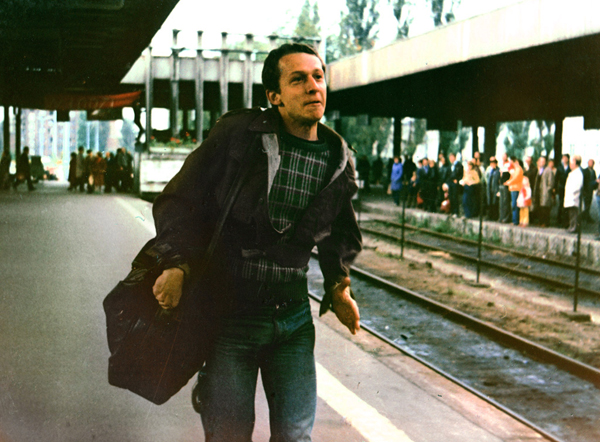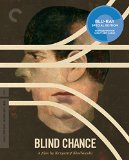| Reviews & Columns |
|
Reviews DVD TV on DVD Blu-ray 4K UHD International DVDs In Theaters Reviews by Studio Video Games Features Collector Series DVDs Easter Egg Database Interviews DVD Talk Radio Feature Articles Columns Anime Talk DVD Savant Horror DVDs The M.O.D. Squad Art House HD Talk Silent DVD
|
DVD Talk Forum |
|
|
| Resources |
|
DVD Price Search Customer Service #'s RCE Info Links |
|
Columns
|
|
|
Blind Chance: The Criterion Collection
As a Polish student rushes to catch a departing train, his fate is determined by three different outcomes in Blind Chance, an acutely observant politically charged drama from the great filmmaker Krzysztof Kieslowski. Criterion's Blu-ray edition presents the film as it was originally shown in 1987 - six years after it was censored and suppressed under Poland's post-Solidarity Communist regime.
Film-wise, Blind Chance is a tough nut to crack, but like Kieslowski's other work it's a thought-provoking examination of the random ways in which strangers' lives intersect. In showing the various possible outcomes in the life of Witek (intensely played by Boguslaw Linda), a young med student straddling Poland's political and generational divide, Kieslowski demonstrated that even the smallest of mishaps can alter the future. Filmed in 1981 - when the 40 year-old auteur was attempting to break free of traditional film narrative, despite the oppressive political climate of the times - the movie comes across as messy around the edges, yet electrifying. The underlying tension constantly seen in Witek could easily be interpreted as Kieslowski's, indignant over Poland's careless treatment of its own youth.
Like a more substantial variant on Run Lola Run or Sliding Doors (two 1998 movies said to have been influenced by this one), the plot of Blind Chance has its hero's fate taking drastically different turns via a seemingly routine event. Opening with a primal scream and a succession of violent, confusing imagery, Kieslowski then takes us into the pivotal scene with Linda's Witek rushing to catch a departing train bound for Warsaw. Along the way, he briefly interacts with an old woman at a ticket window who drops a coin, a wastrel using that coin to buy himself a beer, and a railway station security officer - altercations which affect Witek's fate in three different outcomes. In the first, lengthiest story, Witek catches the train and befriends a Communist official, eventually joining the party and betraying an old girlfriend by turning the woman and her cadre of activist friends over to the authorities. In the second story, Witek misses the train and winds up in an altercation with the police that gets him arrested. While on community service for his crime, he meets a fellow youth who introduces Witek to a group of dissident student activists. In dramatizing an outcome which practically winds up being the opposite of Witek's fate in Scenario #1, Kieslowski makes a jaundiced statement on the malleability of the human spirit.
At first glance, Blind Chance seems too heavily steeped in what Poland was experiencing 1981 to easily slide into. The problems Kieslowski encountered during and after the movie's production kind of show onscreen. Despite that, the final effort ends up beautifully acted and filmed (Kieslowski excels at intimate scenes involving two characters), while Criterion's supplements help put the political angles in context. His skills are especially evident with Witek's third and final scenario, in which Kieslowski cleverly brings together the other two stories in much the same way as in the finale of 1994's Red (the concluding film in his Three Colors trilogy). As in Scenario #2, Witek misses that damn speeding train. Instead of a scrape with the authorities, however, he bumps into a fellow med student at the station. Witek and the girl rekindle their romance, and in short order he's a married father who has a steady job at the local hospital (from Scenario #1, the same locale where student unrest results in a hostage-taking situation). A life of apolitical domesticity delivers the cruelest fate for Witek, however, as he embarks on an ill-fated flight to Paris (the setting for the primal scream at film's opening). Witek's three paths appear completely different on the surface, although the patterns that emerge (meeting a girl, engaging with a seasoned mentor figure, throwing himself into a cause) make it appear that the choices we make aren't nearly as random as we believe.

Note: images are from promotional sources and do not reflect the quality of the Blu Ray under review.
The Blu-ray:
Video
The 1.66:1 image is mastered from an attractive, clean-looking 2012 restoration supervised by cinematographer Krzysztof Pakulski. While the colors were kept deliberately muted throughout, the 35mm photography has an appealing, grainy texture with a good amount of detail. Blind Chance's spontaneous production shows in its shaky visuals (one scene appears to be out of focus), but this disc looks about as good as it can get.
Audio
The 24-bit uncompressed stereo soundtrack was also given a thorough restoration, supervised by Blind Chance's original sound mixer Michal Zarnocki. Although the track doesn't sport as wide a dynamic range as other movies from the early '80s, it's a clean and pleasant track with no apparent instances of distortion, gaps or pops.
Extras
While Blind Chance isn't as stuffed-to-the-gills with supplements as other Criterion discs, there are some worthwhile extras:
- Blind Chance Unshelved (18:12) - in this newly filmed piece, Polish film critic Tadeusz Sobolewski talks about Blind Chance's significance within the context of Kieslowski's career and Poland in general. The film script's references to lesser-known episodes from Poland's past get discussed here, which ended up being incredibly useful.
- Agnieszka Holland (5:24) - this 2003 interview has the director discussing her friendship with Kieslowski and the film's delayed premiere, emphasizing her belief that Blind Chance was one of his strongest films despite Kieslowski's equivocal feelings towards it.
- Censored (9:47) - This piece details the specific segments in Blind Chance that got censored or revised by the authorities in 1981, shown as color footage surrounded by "safe" black and white parts. The excised material included a protest song which got substituted with a song having less pointed lyrics, along with a scene of Witek getting assaulted by the police which only survived with its audio intact.
- Finally, the fold-out insert includes an insightful essay on the film by critic Dennis Lim and a brief excerpt from the 1993 book Kieslowski on Kieslowski with the director's mixed recollections on the film.
Final Thoughts
"We don't ever really know where our fate lies" forms the crux of Blind Chance, a politically-charged, densely layered multi-narrative effort from the great Polish director-screenwriter Krzysztof Kieslowski. Not as accomplished as the auteur's Three Colors trilogy, it's still a fascinating work suffused with the director's spirituality and inquisitiveness. Those unfamiliar with this movie's tangled history or political backdrop (filmed in 1981 during the Solidarity movement; suppressed by the Communists until 1987) will find Criterion's supplements helpful. Recommended.
Matt Hinrichs is a designer, artist, film critic and jack-of-all-trades in Phoenix, Arizona. Since 2000, he has been blogging at Scrubbles.net. 4 Color Cowboy is his repository of Western-kitsch imagery, while other films he's experienced are logged at Letterboxd. He also welcomes friends on Twitter @4colorcowboy.
|
| Popular Reviews |
| Sponsored Links |
|
|
| Sponsored Links |
|
|
| Release List | Reviews | Shop | Newsletter | Forum | DVD Giveaways | Blu-Ray | Advertise |
|
Copyright 2024 DVDTalk.com All Rights Reserved. Legal Info, Privacy Policy, Terms of Use,
Manage Preferences,
Your Privacy Choices | |||||||













